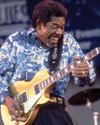
GT: What is it about guitar instrumentals that particularly appeals to you?
JA: A good friend and songwriter came up with a great lyric, “Words are made to lie” which is very appropriate, and I’m too lazy to lie about that which is a luxury not everyone can afford, so to speak.
GT: What can an instrumental provide a listener that a vocal song can’t?
JA: One could say the same about the book or the film about the bible, but in this case I like the film better because it has both. But the mystery in music is greater and takes your spirit to different places. Imagine Django Reinhardt playing on Montmartre at the Hot Club du France on just an acoustic guitar, with Stephan Grappelli on violin.
GT: Are there any tendencies with instrumentals that you aim to embrace or avoid - specific rhythms, harmony, playing approach, tones, etc?
JA: Actually none of these, otherwise I wouldn’t play the guitar. For me it’s a privilege to be able to incorporate all these things in a piece of music written by people who know what they’re doing, and to my shame and scandal sometimes, I can’t live up to the occasion. That’s also the challenge to get better in the art of guitar playing and proceed to develop your own style and not just copy second-hand blues licks (or me in some severe cases).
GT: Is a typical song structure of intro, verse, chorus, middle eight, verse, chorus outro, etc, always relevant for an instrumental?
Denne historien er fra January 2019-utgaven av Guitar Techniques.
Start din 7-dagers gratis prøveperiode på Magzter GOLD for å få tilgang til tusenvis av utvalgte premiumhistorier og 9000+ magasiner og aviser.
Allerede abonnent ? Logg på
Denne historien er fra January 2019-utgaven av Guitar Techniques.
Start din 7-dagers gratis prøveperiode på Magzter GOLD for å få tilgang til tusenvis av utvalgte premiumhistorier og 9000+ magasiner og aviser.
Allerede abonnent? Logg på

THE MOODY BLUES
This month Stuart Ryan delves into the picking style of this British prog legend whose acoustic guitar has powered many a Moody Blues song.

WAYNE KRANTZ
This issue Nick Mellor provides an insight into this brilliant jazz stylist, focusing on his approach to improvising over static chords.

OPEN G TUNING
Open tunings are great fun and can help create exciting new ideas. Simon Barnard shows how to incorporate open G tuning into your playing.

RODRIGO GOUVEIA
Last month we featured Mateus Asato, and mentioned the importance of the neo-soul style in his playing. Here we turn to his fellow Brazilian, the master of neo-soul fusion.

MARK KNOPFLER
Our topic this month is a master craftsman as both guitar player and songwriter. His style is unique and his influence spreads far and wide.

U2
Martin Cooper checks out the chiming pedal delay tones of this stadium-filling band from Dublin, Ireland, and guitarist The Edge.

LUTHER ALLISON
It’s blues with a touch of soul this month, as David Gerrish explores the dynamic, expressive style of an often overlooked Chicago bluesman.

JOHANN KASPAR MERTZ Capriccio
This month Declan Zapala explores the music of Austria at the turn of the Romantic period with a fiery caprice to level up your fingers and unlock your inner virtuoso.

THE CROSSROADS Michael Landau
John Wheatcroft explores the playing of a session ace _ and blazing blues-rock maestro who graces the top-flight m band of singer-songwriting legend, James Taylor.

VIDEO MASTERCLASS Troy Redfern
This month GT welcomes this slide guitar virtuoso. If you've been wanting to take your slide playing to the next level then this is one's for you. With Jon Bishop.